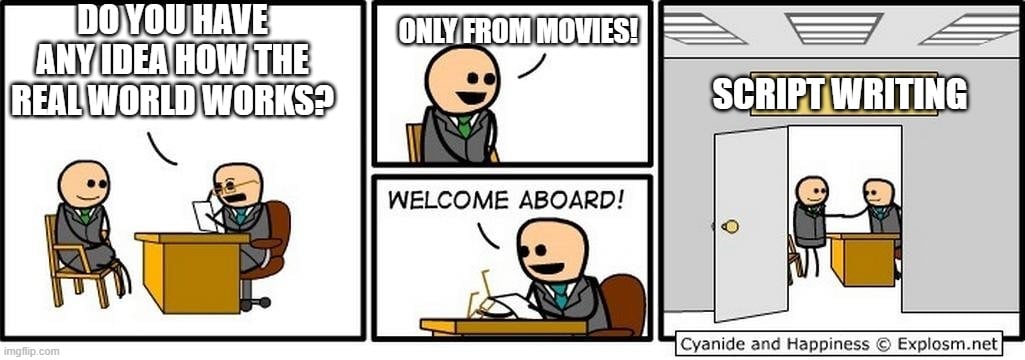this post was submitted on 01 Nov 2024
906 points (98.7% liked)
memes
11894 readers
4306 users here now
Community rules
1. Be civil
No trolling, bigotry or other insulting / annoying behaviour
2. No politics
This is non-politics community. For political memes please go to [email protected]
3. No recent reposts
Check for reposts when posting a meme, you can only repost after 1 month
4. No bots
No bots without the express approval of the mods or the admins
5. No Spam/Ads
No advertisements or spam. This is an instance rule and the only way to live.
A collection of some classic Lemmy memes for your enjoyment
Sister communities
- [email protected] : Star Trek memes, chat and shitposts
- [email protected] : Lemmy Shitposts, anything and everything goes.
- [email protected] : Linux themed memes
- [email protected] : for those who love comic stories.
founded 2 years ago
MODERATORS
you are viewing a single comment's thread
view the rest of the comments
view the rest of the comments

That last part is bullshit. If the force distributed across the plate were enough to break bones, then firing the rifle would dislocate the shoulder of the shooter.
Just because a plate stopped a bullet, doesn't mean the plate then distributed that force evenly across it's whole surface. The bulge on the back side of an impacted plate doesn't form gently.
To add to your point, trauma pads exist to help mitigate this. Blunt force trauma is no joke.
Backface soft armor also catches spall, which can be very dangerous itself. Even ceramic plates can have a danger of ceramic shards. I believe modern ESAPIs, XSAPIs, and such modern plates are designed stand alone, but original SAPIs carried a warning that their rating was only in conjunction with soft armor.
Maybe on a plate from 1965 that is just a sheet of steel inside cloth. Modern ceramic plates spread the energy of the impact.
Here's a video of a Level IV plate taking a 30.06 AP round followed by like 6 5.56 AP rounds and a 7.62x54R AP round so powerful it jammed the rifle.
There's no significant plate bulge even after all of that.
https://m.youtube.com/watch?v=D1qLZwBeMuM
Well, body armor has certainly improved from what i can tell 😅
Mind you, this is what people wear going into combat. It's for military, SWAT, etc.
An everyday police vest wouldn't take that kind of beating.
I would just like to note that they were shooting at 2 separate plates here, and only shot each plate once with the grade of ammo at which they were rated. The first plate they did shoot with 5 smaller rounds after they hit it with the larger one, but they didn't shoot both of those larger rounds at the same plate.
Those "smaller rounds" were extremely hot 5.56 rounds - an upgraded version of the rounds the guy above me is saying fires through brick walls and cracks ribs if it hits armor.
All the guy you replied to said was that the bulge on the back of the plate from each of those rounds forms fast and hard enough that you'd feel it. Top comment of this chain was a different account.
The momentum is the same, the impulse (and therefore forces) are very different. The bullet is propelled down the barrel gradually - the force is spread through the entire time it takes the bullet to travel the length of the barrel, the reaction forces are applied to the stock gradually, and spread over the area of contact between the shooter and the gun.
A bullet stopped by a vest/plate has a much larger impulse. The bullet needs to be stopped essentially immediately, rather than gradually slowed down over a length equivalent to a rifle barrel, otherwise it kills you. The force is also more concentrated, occuring over the cross-sectional area of the bullet, rather than over the entire contact surface with the rifle.
In modern body about it's spread over the area of the entire 8lb plate, which is way, way more area then the butt of the rifle.
Okay, neat. Fire a rifle with the stock held just in front of your floating ribs instead of welded to your shoulder and get back to us.